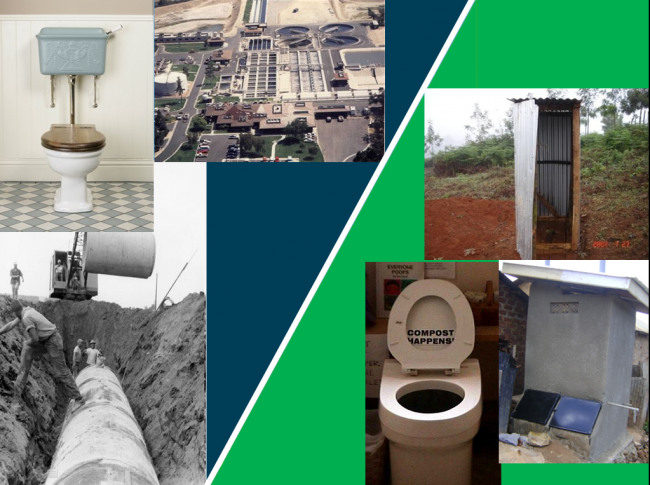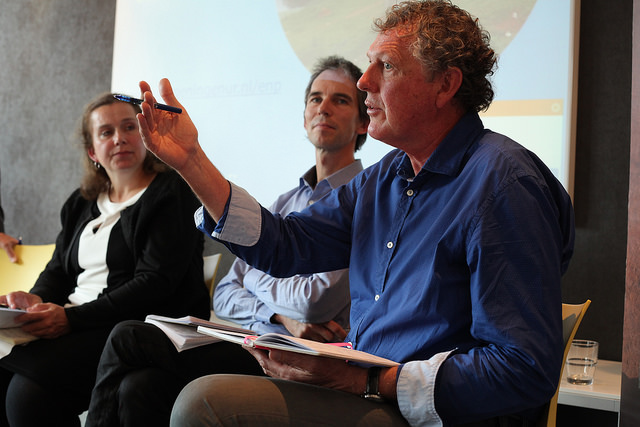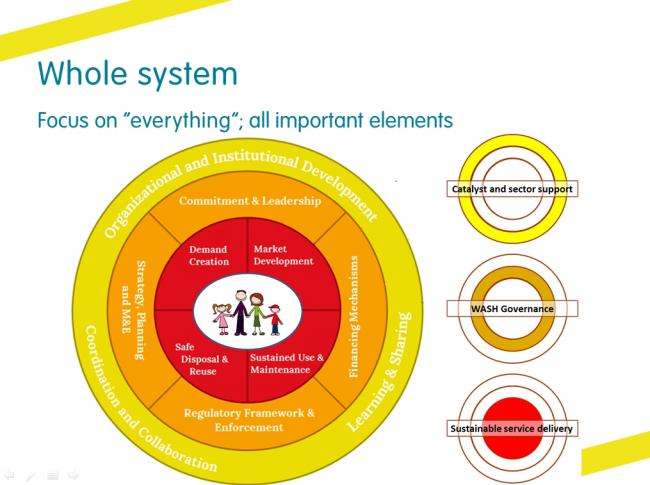Experts discuss integrated approaches at IRC event in The Hague.
Published on: 17/09/2015

The Sustainable Development Goal for sanitation (SDG6) promises universal access by 2030. This is a huge ask, especially for urban areas where about 800 million people still lack access to improved, let alone sustainable sanitation.
So what kind of approaches are on offer? How should they be implemented? Where do you start? These are the questions that practitioners, donor representatives and academics tried to answer on 9 September at the IRC Event “Working towards sustainable urban sanitation” in The Hague.

Dr Marielle Snel introduced the systemic or "whole system change" approach, which looks at the whole sanitation chain, as described in IRC's working paper Towards systemic change in urban sanitation. The change process is divided into three distinct phases: (1) initiation, (2) learning and testing, and (3) replicating and scaling.
Dichotomy buster Bas van Vliet, an associate professor from Wageningen University, talked about a cocktail of "modernised mixtures". This approach emerged from research in East Africa. Neither conventional large-scale nor alternative small-scale technologies by themselves will solve urban waste and sanitation problems, Van Vliet said. The answer lies in combining technologies and modes of governance from both centralised and de-centralised systems.
For WASTE practitioner Jan Spit “diamonds are forever”. Not the sparkling gems, but the Diamond Model that is built around sanitation service and value chains. This multistakeholder approach involves households (demand), government (regulation), (local) financiers and business (supply), supported and facilitated by an NGO. Watch the video below!
Implementation
 There was a lively discussion on the best way to implement holistic or integrated approaches to urban sanitation. Pim van der Male, from the Dutch Ministry of Foreign Affairs mentioned that these approaches required “add ons” with a price tag and therefore required additional resources from other sources. He was interested to learn more about phasing and dividing holistic programmes into manageable chunks. The Ministry recently announced a 6% increase for the budget for water, sanitation and hygiene (WASH) along with a commitment to provide improved sanitation to 50 million people and safe water to 30 million between 2015-2030,
There was a lively discussion on the best way to implement holistic or integrated approaches to urban sanitation. Pim van der Male, from the Dutch Ministry of Foreign Affairs mentioned that these approaches required “add ons” with a price tag and therefore required additional resources from other sources. He was interested to learn more about phasing and dividing holistic programmes into manageable chunks. The Ministry recently announced a 6% increase for the budget for water, sanitation and hygiene (WASH) along with a commitment to provide improved sanitation to 50 million people and safe water to 30 million between 2015-2030,
 Sharon Roose from Plan Netherlands said they had learned that Urban Led Community Total Sanitation (ULCTS) was a good approach to trigger demand for sanitation but not a silver bullet. They support WASTE’s Diamond Model approach of involving local government health promoters in demand creation and helping households get loans for toilet construction.
Sharon Roose from Plan Netherlands said they had learned that Urban Led Community Total Sanitation (ULCTS) was a good approach to trigger demand for sanitation but not a silver bullet. They support WASTE’s Diamond Model approach of involving local government health promoters in demand creation and helping households get loans for toilet construction.
 Dr. Sunil Tankha from the International Institute of Social Studies (ISS) agreed that understanding complex systems does help as long as we come up with contextualised solutions that make sense. In Uganda and DR Congo, finance may be a significant constraint, whereas this is not the case in India that is constrained more by overburdened bureaucrats, low demand and supply chain problems. He suggested to create four generic approaches to urban sanitation for different country contexts.
Dr. Sunil Tankha from the International Institute of Social Studies (ISS) agreed that understanding complex systems does help as long as we come up with contextualised solutions that make sense. In Uganda and DR Congo, finance may be a significant constraint, whereas this is not the case in India that is constrained more by overburdened bureaucrats, low demand and supply chain problems. He suggested to create four generic approaches to urban sanitation for different country contexts.
In her presentation, Marielle Snel emphasised that the initial phase in the systemic change process was crucial. All else will fail unless you can build trust and agree on a vision, strategy and plan that are rooted in a comprehensive assessment. A key message, echoed by other participants at the IRC event, was the need to establish local ownership and local leadership from the very beginning. This is especially important in aid dependent countries like Ghana, where the lack of local ownership was cited as hampering the progress of the Ghana-Netherlands WASH Programme (GNWP).

Do you scale-up based on proof-of-concept, or do you tackle the whole system at scale step-by-step? No definite answer emerged during the discussions at the IRC event. Please share your views on this specific issue or on what you think is the best way to achieve sustainable urban sanitation in the Comments section below.
You can find the presentations from the IRC Event in the list of Resources below. Photos from the event are available on Flickr.
The next IRC event will be on innovative approaches to WASH in emergency situations and will take place in November 2015 in The Hague.
If you wish to be added to the mailing list for future IRC Events, please mail us at communications@ircwash.org.
At IRC we have strong opinions and we value honest and frank discussion, so you won't be surprised to hear that not all the opinions on this site represent our official policy.